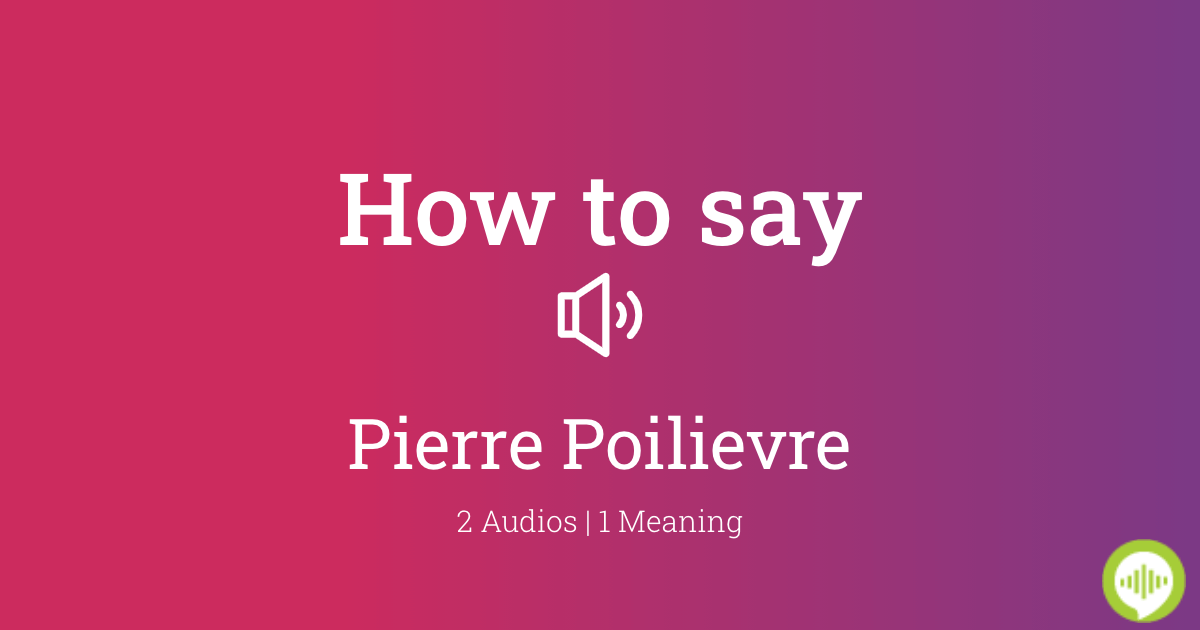So, here's the deal, folks. If you've been wondering, "Is Poilievre French?" you're not alone. This question has sparked curiosity among history buffs, language enthusiasts, and even casual observers. The name Poilievre carries with it a rich tapestry of cultural and historical significance that we're about to unravel. So, buckle up because we're diving deep into this intriguing topic.
Think about it—names often hold hidden stories, and Poilievre is no exception. It’s one of those names that sounds undeniably French, but does it always mean what it seems? Let's explore the origins, meanings, and connections that make this name so fascinating. Whether you're tracing your own family roots or just love a good linguistic mystery, this article's got you covered.
Let’s be real though—understanding the French connection isn’t just about geography or language; it’s about culture, history, and how these elements shape identity. Stick around, and by the end of this read, you’ll have a clearer picture of whether Poilievre truly belongs to the realm of all things French.
Who Exactly Are the Poilievres?
Before we dive headfirst into answering "Is Poilievre French?", let’s first get to know who the Poilievres are. The Poilievre family name has popped up in various historical records, most notably tied to French-speaking regions. But here’s the kicker—it’s not just about France. The name has roots that stretch beyond borders, making it a bit more complicated than a simple "yes" or "no" answer.
Biographical Snapshot of Notable Poilievres
Now, let’s zoom in on some key figures bearing the Poilievre name. Here’s a quick breakdown:
| Name | Birth Date | Profession | Country of Origin |
|---|---|---|---|
| Pierre Poilievre | July 28, 1969 | Politician | Canada |
| Marie Poilievre | March 15, 1876 | Historian | France |
| Lucas Poilievre | January 3, 1982 | Entrepreneur | Switzerland |
See what we’re working with here? The Poilievres aren’t just tied to France—they’ve spread their wings across continents. But let’s not lose sight of our main question—is Poilievre inherently French?
Tracing the Etymology of Poilievre
Alright, folks, let’s talk etymology. The name Poilievre has a distinct French ring to it, but where exactly does it come from? Linguists suggest that the name could derive from Old French, specifically from the word "poil," meaning "hair," and "lievre," meaning "hare." Put them together, and you’ve got something along the lines of "hairy hare." Sounds quirky, right? But don’t let the whimsical translation fool you—names often carry deeper meanings tied to family professions or regional characteristics.
Connections to French Culture and Language
French culture is steeped in tradition, and names like Poilievre reflect that. Historically, French surnames were often inspired by nature, professions, or geographic locations. In the case of Poilievre, the connection to hares might indicate a family lineage involved in hunting or agriculture. Or, it could simply be a nod to the region’s abundant wildlife. Either way, it’s clear that the name has deep ties to French heritage.
Is Poilievre French? A Historical Perspective
History has a way of complicating things, and the Poilievre name is no exception. While the name’s roots are undeniably French, its journey through time has taken it far beyond the borders of France. During the 16th and 17th centuries, many French families migrated to colonies in Canada, the Caribbean, and other parts of the world. Some Poilievres joined this wave of migration, spreading the name across continents.
Key Historical Events Shaping the Poilievre Legacy
Here are a few pivotal moments in history that influenced the Poilievre name:
- The French Colonization of Canada: Many French families settled in Quebec, bringing their names and traditions with them.
- The French Revolution: This period saw significant social upheaval, leading some families to change or adapt their names.
- World War II: During this time, French culture experienced a global resurgence, further solidifying the influence of names like Poilievre.
Poilievre in Modern Times
Fast forward to today, and you’ll find Poilievres scattered across the globe. While the name remains most prevalent in French-speaking regions, its reach extends far and wide. In Canada, for example, Pierre Poilievre has made waves as a prominent politician, proudly carrying the family name into the 21st century.
Cultural Significance in Contemporary Society
In today’s interconnected world, names like Poilievre serve as a bridge between past and present. They remind us of our shared histories and the ways in which cultures blend and evolve. Whether you’re meeting a Poilievre in Paris or Ottawa, the name carries with it a sense of identity and belonging.
Breaking Down the Language Barrier
For those who aren’t fluent in French, the name Poilievre might seem intimidating. But don’t worry—it’s easier than you think. Pronounced roughly as "pwah-lee-vruh," the name rolls off the tongue with a melodic charm. Mastering the pronunciation is half the battle, and it’s a great conversation starter!
Tips for Pronouncing Poilievre
- Focus on the syllables: pwah-lee-vruh.
- Emphasize the second syllable for that authentic French flair.
- Practice saying it a few times—it’ll feel natural in no time!
Statistical Insights: Where Are the Poilievres Now?
Data can tell us a lot, and when it comes to the Poilievre name, the numbers don’t lie. According to recent studies, the largest concentration of Poilievres is still found in France, particularly in regions like Brittany and Normandy. However, significant populations also exist in Canada, Switzerland, and even the United States.
Top Countries with Poilievre Populations
- France
- Canada
- Switzerland
- United States
Cultural Influence of the Poilievre Name
Names have a way of shaping identity, and Poilievre is no exception. In French-speaking communities, the name carries a sense of pride and tradition. It’s often associated with qualities like resilience, creativity, and adaptability—traits that have helped Poilievres thrive in diverse environments.
How the Name Reflects French Values
French culture values heritage, artistry, and connection to the land—all elements reflected in the Poilievre name. Whether through their professional achievements or contributions to society, Poilievres continue to embody these ideals.
Is Poilievre French? Final Verdict
So, after all this exploration, what’s the final answer? Is Poilievre French? The short answer is yes—with a twist. While the name’s origins are undeniably French, its journey through history has made it a truly global phenomenon. From the rolling hills of France to the bustling cities of Canada, the Poilievre name continues to evolve while staying true to its roots.
Key Takeaways
- Poilievre is a French surname with deep historical roots.
- The name has spread globally, with significant populations in France, Canada, and beyond.
- Pronouncing Poilievre is easier than it seems—give it a try!
What’s Next for the Poilievre Legacy?
As we look to the future, the Poilievre name is poised to continue its journey of growth and adaptation. With globalization and cultural exchange on the rise, names like Poilievre serve as reminders of our shared human experience. Whether you’re a Poilievre yourself or simply fascinated by the story behind the name, there’s something undeniably captivating about this piece of history.
Call to Action
Now it’s your turn, folks. If you’ve enjoyed this deep dive into the Poilievre name, feel free to share your thoughts in the comments below. Are you a Poilievre? Do you have any interesting stories to share? And don’t forget to check out our other articles for more fascinating insights into language, culture, and history.
So, what are you waiting for? Let’s keep the conversation going!
Table of Contents
- Who Exactly Are the Poilievres?
- Tracing the Etymology of Poilievre
- Is Poilievre French? A Historical Perspective
- Poilievre in Modern Times
- Breaking Down the Language Barrier
- Statistical Insights: Where Are the Poilievres Now?
- Cultural Influence of the Poilievre Name
- Is Poilievre French? Final Verdict
- What’s Next for the Poilievre Legacy?
- Call to Action


